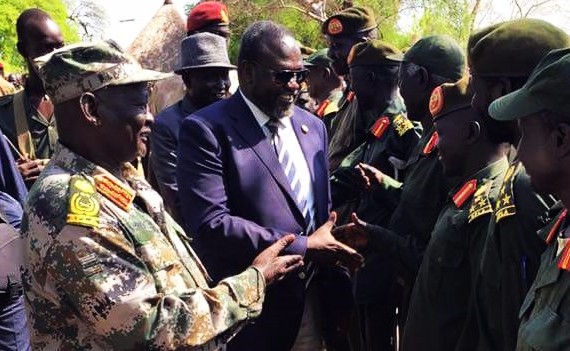SPLM-IO says Machar would not be soon in Juba, blames IGAD Plus

September 6, 2016 (JUBA) – The main armed opposition faction led by the former First Vice President, Riek Machar, said their leader will not return to the national capital, Juba, until “important” changes have been effected for the transitional security arrangements in the capital.
Responding to Sudan Tribune’s queries on whether Machar would soon return to Juba to reclaim his position as First Vice President per the 5 August communiqué of the IGAD heads of state and government which the leaders released in Addis Ababa, Machar’s spokesman, James Gatdet Dak, said “corrections” will be made first in Juba before Machar’s return.
“No, his return to Juba is not our top priority now. There is need first to change the situation in Juba. Both the current political and security situations in Juba should change first,” Dak said, without giving details.
He said President Salva Kiir and his “anti-peace groups” have not abandoned their determination to eliminate Machar and perpetuate violence, adding they were waiting for a third opportunity after their failures to murder him on 15 December 2013 and on 8 July 2016. He was referring to the two separate incidents during which Machar’s residents were attacked twice by forces loyal to President Kiir.
“It would be an unforgivable negligence and carelessness on our part if we would again allow our leader to go back to Juba just to face another attack for the third time,” he said.
The opposition faction, he added, will make sure that Machar’s next return to Juba will not be another handing over to President Kiir to slaughter him.
IGAD-PLUS ERRED
Dak also blamed the mediation body of the East African regional bloc, the Intergovernmental Authority on Development (IGAD), plus representatives from the international community including the United States, for imposing transitional security arrangements which weakened Machar and gave President Kiir the opportunity to renew violence in the capital.
“Although we appreciate IGAD for the relentless efforts the bloc exerted to help end the war in South Sudan, I believe that they also erred in their imposed transitional security arrangement for the capital, Juba. Giving Dr. Riek Machar only a very small number of protection forces in Juba meant that it was an opportunity for Salva Kiir to attack him without thinking about repercussions,” Dak said.
He said if the two rival armies had deployed equal numbers of troops in the capital, this would have served as “deterrence” and President Kiir and his forces would not have started the fighting at the palace. He argued that the peace agreement would have been implemented smoothly until 2018 elections.
“We know the mentality of those comprising the current political and military leaderships in Juba. Once they have the upper hand militarily, they would be obsessed with that power and would definitely abuse it. If we had equal numbers of troops in Juba, even if it was to be strictly a ratio of 2 from their side to 1 from our side, they would not have dared to attack our leader and his forces. They would have thought it twice,” he said.
Dak said it was unfortunate that only 1,300 of their forces were transported to Juba out of another only 2,910 allowed in Juba for the transitional security arrangements, while the government was given 5,000 and also failed to withdraw from the capital another extra force of over 40,000 stationed in and around Juba.
Those in the international community who pushed Machar to return to Juba, despite “improper” security arrangements, he said, could not do anything to stop President Kiir from the assassination attempt against Machar and for dislodging him from Juba and hunting him down for more than five weeks in the bushes, as well as illegally replacing him as peace partner.
“They were dumbfounded and simply watched the show helplessly,” he challenged.
He commended the opposition’s only over 1,000 troops in Juba for fighting “courageously in self-defence” at the presidential palace and at Jebel area when Machar’s residence was also attacked but successfully rescued him up to the Congolese border, “despite facing tens of thousands of Kiir’s forces, backed by tanks, heavy artilleries and helicopter gunships.”
When asked about President Kiir’s claims that he saved the life of their leader inside the palace on 8 July, Dak said the claim was not true, explaining that many of Machar’s close bodyguards, including some of his convoy’s drivers, were also inside the palace compound with him.
“He [Kiir] planned to kill him [Machar], so how would he save him if he had the opportunity? The fact is that he did not get that opportunity because he would have risked his own life as well if he had attempted to harm Dr. Machar in the palace,” he said.
He revealed that many of President Kiir’s bodyguards were also killed not only outside the palace, but also inside the palace compound during the clashes and that Machar’s bodyguards were in full control of the southern gate while Kiir’s bodyguards were in control of the northern gate of the palace.
He said two senior officers in charge of the bodyguards from both sides were the ones who ordered the rival bodyguards to stop shooting inside the compound in order not to risk the lives of the two leaders.
The fighting which erupted outside the palace saw the death of nearly 300 rival troops, with the opposition reportedly losing 37 out of the total 70 bodyguards who accompanied Machar to the palace. President Kiir reportedly had several hundreds of bodyguards deployed around and near the palace at the time.
The opposition leader’s spokesman said they will be extra careful next time in making sure the security situation in Juba is not to the advantage of President Kiir “who attacks others at will.”
“We will not allow this situation to repeat itself,” he said, adding “We will make sure the situation has to change first.”
(ST)
